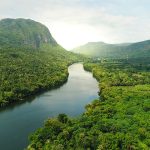According to a new study published in the journal Science, tropical forests may soon be unable to continue absorbing carbon due to global warming. This can create a negative natural loop.
We know that forests and trees store CO2 and help regulate the climate. By absorbing CO2 for their development, plants slow down the climatic transformations induced by human-caused CO2 emissions.
In theory, plants even adapt to the CO2 concentration of the atmosphere: the more carbon-rich the air, the more intense the photosynthesis, and the faster the plants grow. For a long time, it was thought that with more carbon in the atmosphere, forests would grow faster and that they would store more carbon.
But recent studies contradict this intuition. A recent study published in the journal Science even estimates that from a certain threshold of global warming, tropical forests may be unable to continue to store carbon. Further explanations ahead.
CO2, Trees and Global Warming: Why It Is Complicated
Before jumping into the topic straight ahead it is important to note that the relationships between atmospheric carbon, photosynthesis, plant growth, and their capacity to store carbon are not simple and are not yet very well known by scientists.
As said earlier, it has for long been thought that in a carbon-rich atmosphere, plants grew faster, allowing them to store more carbon. This mechanism would then help slow down global heating. But in reality, things are more complex.
When a tree grows faster, it does not necessarily store more CO2. First of all, because it can shorten its longevity: it can store a lot in the short term but reduce the overall, long-term storing. Second, because a tree growing faster is not necessarily a sign of increased storage of CO2 in the ecosystem: when the tree grows faster, it is sometimes its underground biomass that grows less quickly, or the soil capacity to store carbon that decreases.
In any case, the relationship between atmospheric CO2 and the carbon storage capacity of plants is not entirely clear. And it could be that in a changing atmosphere, what we know on this subject also changes. But it becomes even more complicated when other parameters come into play: the temperature for example. However, a study recently published in Science shows that in certain warmer ecosystems, the capacity of plants to store carbon changes.
Tropical Forests Are Threatened by a Warmer Climate
The study mentioned above was conducted on tropical forests, sought to understand better the thermal sensitivity of forests – that is to say, the way a forest changes according to temperature modifications.
Scientists have observed nearly 600 areas of tropical forest and studied their evolution as a function of temperature. The result? They found that when average temperatures increase over the long term in a forest area, tree growth is slowed down.
Each additional degree of temperature reduces the plant biomass per hectare, and the effect is more pronounced as the temperature increases. In addition, high temperatures tend to kill more trees and plants, which could accelerate carbon leakage from the ecosystem to the atmosphere.
In summary: confronted with a warmer climate, tropical forests become less good at storing carbon.
Protecting Forests to Protect the Climate… and Vice Versa
This study reinforces the fears affirmed for many years now by forest specialists. This shows climate change is a serious threat to forests: a few months ago, another study published in the journal Nature also estimated that the carbon storage capacity of tropical forests was threatened by climate change.
These conclusions encourage to further strengthen the urgency of forest protection and the fight against global warming. These two phenomena have the particularity of self-sustaining each other: the degradation of forest ecosystems reinforces global warming, which in turn contributes to degrading forests. Both these issues need be to fought together, and urgently.
[Image credits to Shutterstock on scenery]

